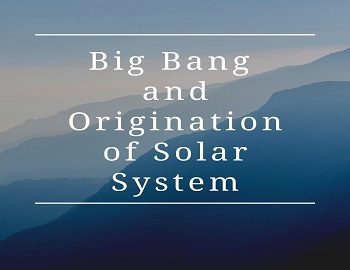Big Bang and Origination of Solar System:
It is believed that 10,000-20,000 million years ago, the universe consisted of a single piece of concentrated matter and this matter got exploded into fragments throwing out hydrogen atoms and related nuclei which got organised into galaxies. The exploding of the matter is called the Big Bang. It is estimated that there are about 100,000 million galaxies in the universe. All the galaxies appear to be moving away from one another at high speed. In each galaxy, stars are born and die continuously. Our galaxy is known as the Milky Way.
The stars which we see with our naked eye belong to our galaxy. Sun is one such star and along with the orbitting planets and their satellites, the comets and asteroids, constitutes our solar system. Our earth is a part of solar system.
Different theories have been given to explain the origin of the solar system. The most prevalent view about the origin of the solar system is by the gravitational contraction (condensation) of a cold cosmic cloud of dust and gas termed as a nebula. It is believed that during condensation, this cloud began to rotate due to the initial velocities of the particles brought together. This condensation continued for quite some time and in the process, most of the mass concentrated near the centre and the flat disc-like structure broke into a number of whirling masses of smaller clouds. The sun originated from the dense centre. Due to condensation, the temperature increased as a result of which nuclear reactions started and the new star ‘sun’ began to radiate energy. The planets, including the earth, were formed from the cooler, less dense outer regions, practically in the same plane. Condensation occurred in each of the smaller clouds concentrating the heavier elements at the centre.









Comments (No)